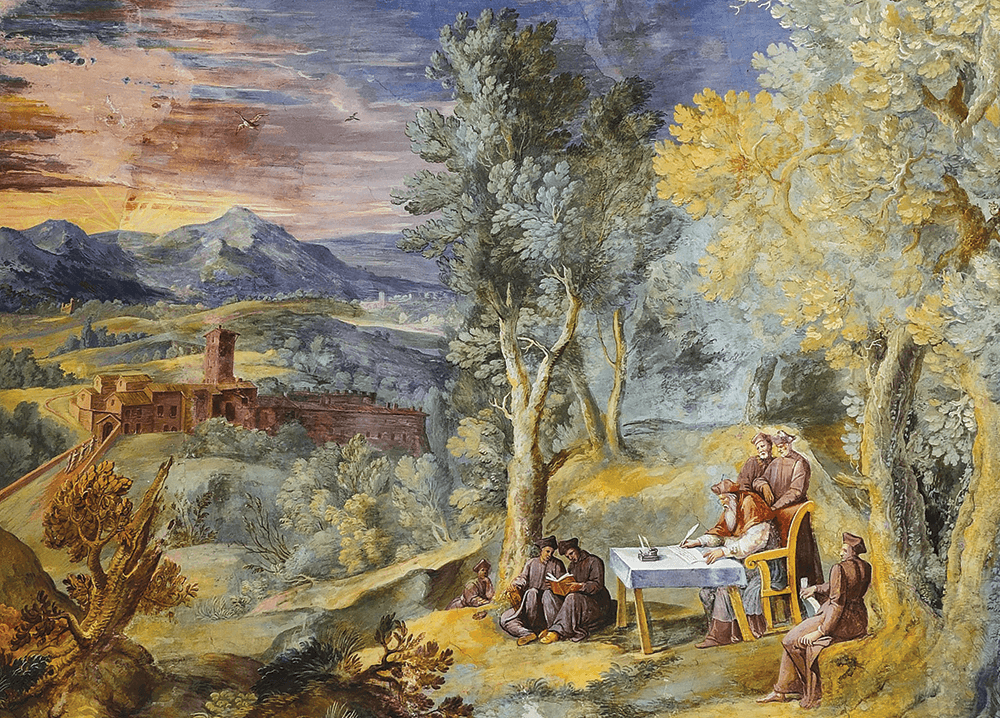Above: Detail of Cardinal Peter Damian (1007-1072 AD) recruiting monks, from the Vatican Museum.
Proemium
Thank you for reading our Substack! We hope to keep our content free for all subscribers. However, if you enjoy our writing and would like to support us, you may opt for a paid subscription at one of our rates. We’d greatly appreciate it!
Our vision for this Substack is twofold.
In Veritatis Splendor, St. John Paul II reminds us of the Church’s
duty in every age of examining the signs of the times and interpreting them in the light of the Gospel, so that she can offer in a manner appropriate to each generation replies to the continual human questionings on the meaning of this life and the life to come and on how they are related.1
Our first aim is to aid Mother Church in discharging this duty. In addition to the perennial questions of human concern, today there are a thousand pressing attacks on our Catholic faith, our culture, our families, our souls. These we must understand and clearly describe, rebut, analyze, and ultimately bring under submission to the gospel of our Lord—to the best of our ability and for the sake of bearing witness to the Truth.
Sir Francis Bacon once said,
Reading maketh a full man; conference a ready man; and writing an exact man.2
Our second aim, then, is to build Catholic Culture, part of which involves forming men to be full, ready, and exact in Bacon's sense. The Catholic should, to the best of his ability, boast a mind sharpened by reading, conference (i.e., controversy and dialectic), and writing. He should be capable to understand and judge the times in which he lives, "ready always to give an answer to every man that asketh for a reason of the hope that is within him."3
We hope to sharpen our minds, hone our writing skills, and make available to a general audience the kind of writing and discussion we wish we could find elsewhere in the blogosphere: short, cogent, interesting, fun to read—as opposed to stream-of-consciousness writing, “hot takes” to pontificate on something in the news when we haven’t had proper time to reflect on it, attention seeking, and so on.
How do we hope to achieve these aims?
Consider the concept of controversy as the impetus for study and growth in knowledge. St. John Henry Newman once lamented that he could not focus his mind upon one subject long enough to become a real expert in it. In response to a high praise on his writing, he said:
A man must be very much out of the common to deserve the great names with which you honour me; and for myself, certainly, when I have reflected from time to time on the fact of the variety of subjects on which I have written, it has commonly been whispered in my ear, "To be various is to be superficial." I have not, indeed, blamed myself for a variety of work, which could not be avoided; I have written according to occasion, when there was a call on me to write.4 [emphasis ours]
Elsewhere he wrote of the Church Fathers,
Instead of writing formal doctrinal treatises, they write controversy; and their controversy, again, is correspondence. They mix up their own persons, natural and supernatural, with the didactic or polemical works which engaged them... They do not write a summa theologiæ, or draw out a catena, or pursue a single thesis through the stages of a scholastic disputation. They wrote for the occasion, and seldom on a carefully-digested plan.5 [emphasis ours]
We resonate with Newman’s remarks. We have not the leisure to probe into subjects to our perfect satisfaction. We, like Newman, must write for the occasion.
Our writing will largely consist of short essays (usually under 1000 words)—mostly argumentative but sometimes commentary or reflection—on the things we care about: things we have to reckon with just by living as Catholics in the present age. Controversies as they arise fuel our study and our writing. Sometimes the occasion demands an argument against abortion or in favor of Catholic sexual ethics, a defense of the New Testament reliability or a response to Protestant critiques. Regardless of topic, we hope our readers follow our every word.
Disclaimers:
We are not professionals. And although we write as Catholic laymen—full-time working husbands and fathers—we write for any audience that cares about the topics we address and the manner in which we address them.
We oppose gratuitous insults, but we will never shy away from bearing witness to the truth—even if some people find it offensive.
We do not condone idle chatter, but occasionally we will write on lighter subjects.
This is a hobby for us and we will be unable to respond to every comment or inquiry.
We invite you to join us as we attempt to become full, ready, and exact.
Veritas Per Contoversiam.
He was paraphrasing a line from Gaudium et spes, the Second Vatican Council’s Pastoral Constitution on the Church in the Modern World, section 4.
“Of Studies“ (1597).
1 Peter 3:15.
Reply to Mr. Edward Lucas. https://www.newmanreader.org/works/sayings/file1.html
“The ancient saints (St. Chrysostom)”, The Rambler, May 1859. https://newmanreader.org/works/historical/volume2/saints/chrysostom/chapter1.html





